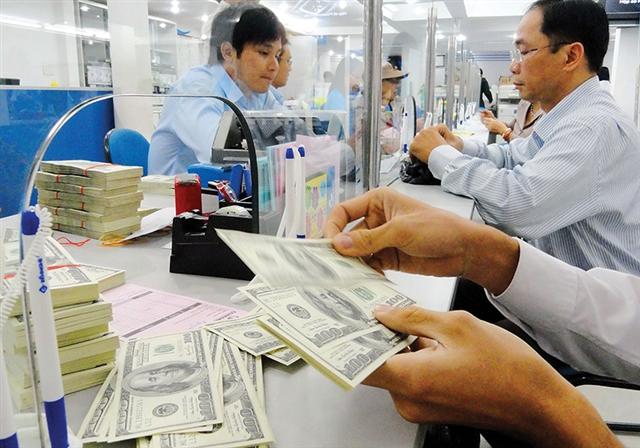Lenders request new debt guidance
Lenders request new debt guidance
Credit institutions are hankering for detailed guidance on handling rescheduling debt groups to assist affected businesses and individuals due to the health crisis, which is expected to be unveiled soon by Vietnam’s central bank.

The State Bank of Vietnam is studying Circular 01 in order to provide further help to businesses. Photo: Le Toan
|
Nghiem Xuan Thanh, chairman of Vietcombank’s Board, said the bank recorded its non-performing loans (NPL) ratio at 0.61 per cent of its total outstanding loans – the lowest level among credit institutions and also the lowest in the bank’s history.
However, it and other lenders are looking forward to soon-to-be launched instructions from the State Bank of Vietnam (SBV) to deal with a prospective surge in bad debts stemming from the pandemic.
In the same boat, OCB general director Nguyen Dinh Tung commented, “NPLs have tended to fall compared to the mid-2020 period. At the moment, enterprises are showing signs of fairly quick recovery as health challenges get under control. I’ve highly appreciated the continuous support of the central bank, especially its Circular No.01/2020/TT-NHNN to help businesses ride out the bumps.”
In March 2020, the SBV promulgated Circular 01 providing regulations on the credit institutions and foreign bank branches’ debt rescheduling, exemption and reduction of interest rates and fees, and keeping the debt group in order to support customers affected by the COVID-19 outbreak.
Meanwhile, the NPL ratio of another state-owned bank, VietinBank, was projected to decline from 1.2 per cent in 2019 to below 1 per cent for 2020.
VietinBank general director Tran Minh Binh said, “NPLs decreased so the rate of provisioning for bad debts at VietinBank continued to increase, from 120 to 130 per cent. Literally, for each VND1 of sour debts, VietinBank prepares VND1.3 in provisions.”
In addition, VietinBank also bought all special bonds from the Vietnam Asset Management Company in less than two years, from the end of 2018 to October 2020, instead of five years as initially planned. Notably, the NPL ratio decreased while VietinBank’s credit balance in 2020 remained in an upward trajectory, and was estimated to have increased by 7.7 per cent compared to 2019.
Other foreign lenders operating in Vietnam also actively assist vulnerable customers, such as South Korean-backed Shinhan Bank Vietnam, Standard Chartered Vietnam, Citibank Vietnam, and HSBC Vietnam.
Trinh Bang Vu, head of Retail Banking at Shinhan Bank Vietnam, told VIR that the bank has trimmed its interest rates four times to assist affected customers, not to mention additional support such as discounts on loan packages for certain individual customer segments, in line with Circular 01.
Currently, Shinhan Bank offers 10-18 per cent annual interest rates for unsecured consumer loans, while car loans go from 6.8 to above 8 per cent and mortgages from 6.5 to over 8 per cent per year.
Vu emphasised that it would be difficult to depress rates even further. In case of an additional reduction, the rates would only be available at select branches as banks need to keep some wiggle room to manoeuvre in 2021 as well.
Circular 01 also provides credit institutions a leeway to assist severe impacted debtors and enables them to contain NPL ratio and credit cost in 2021 at manageable levels.
According to economist Can Van Luc of BIDV Training School, VND355 trillion ($154.4 million) of debts have been rescheduled as per Circular 01 as of December 2020, about 4 per cent of which are potential NPLs, which could stir up troubles for lenders.
Luc emphasised that in 2021, the NPL ratio in the balance sheet (which is different from off-balance sheet debts) might rise to 3.5-4 per cent.
SBV Deputy Governor Dao Minh Tu noted that the central bank is actively studying to amend Circular 01 so that more businesses can benefit from the newly-amended guidance.
Luc, meanwhile, said prolonged restructuring time of the debt category will pose more challenges for the banking group. However, lack of appropriate time will cause a shock to the banking system in general, when NPLs soar.
“Therefore, Circular 01 should last until the end of 2021 when COVID-19 will show signs of ease, and businesses and banks gain ground. If the circular is not issued with an amendment in time, many businesses will come under pressure from their overdue debts, thus hampering their ability to borrow,” he said.
Deputy Governor Tu also reaffirmed his belief that the amendment of Circular 01 will continue to support businesses and individuals to recover quickly. “However, it is of utmost importance to pay attention to the financial safety of credit institutions in the short and medium term as well,” he added.
Tu explained that there will be official guidance on banks’ provision across a certain time frame. “For example, it could be in three years so that banks can handle loans, creating favourable conditions for businesses and banks alike. This is the view of the SBV and the Ministry of Finance, hence the amended circular will soon be published,” Tu said.
























